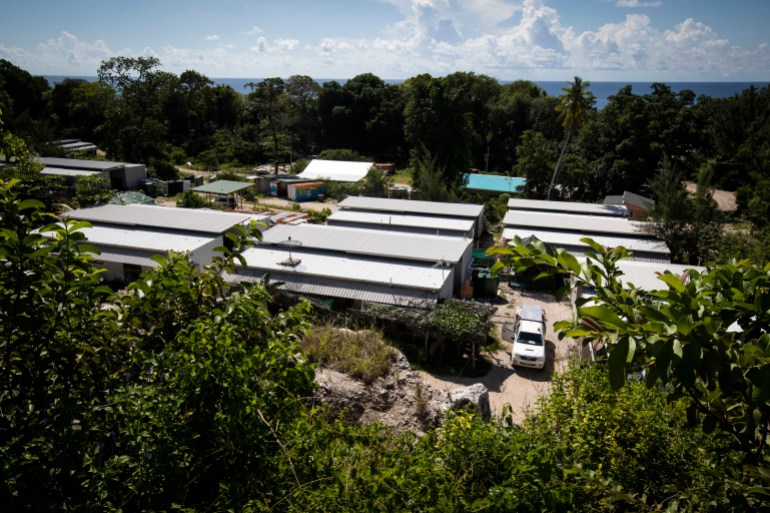Omid Masoumali: Australia urged to end refugee detentions
Findings of inquest into Iranian refugee’s death spurs calls for an end to Australia’s ‘inhumane’ offshore detention policy.

Melbourne, Australia – Campaigners are once again calling on Australia to end offshore detention for refugees after an inquiry found that “inadequate” and “inferior” healthcare was a factor in the death of an Iranian asylum seeker, who set himself on fire after being held on Nauru for more than three years.
Activists said Monday’s findings into Omid Masoumali’s death in 2016 show the Australian government should take urgent action to resettle the more than 200 asylum seekers still “trapped” in Nauru and Papua New Guinea (PNG).
Keep reading
list of 4 itemsTears and hugs as Australia reopens international borders
Capturing Change: Australia’s Black Summer Warning
Coal mining or climate action? Australia faces up to COP26
“Omid’s death should lead to significant reform of Australia’s inhumane and cruel offshore immigration processing system,” said George Newhouse, principal solicitor of the National Justice Project. “All remaining individuals in PNG and Nauru must be resettled as a matter of urgency.”
Masoumali and his partner were transferred to Nauru in 2013 under Australia’s “regional processing system” for asylum seekers who travel to the country by boat. The pair were granted refugee status the following year but continued to be held in limbo in Nauru.
Then on April 26, 2016, Masoumali set himself alight in front of officials from the United Nations refugee agency.
The self-immolation came days after the 23-year-old tried to book an appointment with a psychologist, according to the coronial inquest.
But the mental health staff working at the clinic in Nauru treated Masoumali’s request as “non-urgent”, Coroner Terry Ryan said, describing the move as a “missed opportunity” to intervene.

At that point, Masoumali was likely “indifferent to whether he lived or died,” Ryan said.
“I consider that his actions were those of someone who had given up hope and felt powerless as a result of his prolonged placement on Nauru.”
Death in a Brisbane hospital
Following the self-immolation, Masoumali suffered burns to more than 50 percent of his body and was initially treated at the Republic of Nauru Hospital (RNH). But he was “not monitored and observed appropriately”, according to Ryan, and his deterioration “was not identified in a timely manner” because clinicians at RNH “were hampered by a lack of training in burns, a lack of equipment and a lack of infrastructure”.
After 31 hours, Masoumali was evacuated to a hospital in Brisbane, where he died of organ failure.
Ryan said the refugee’s chances of survival would have “greatly increased” had emergency care on Nauru been better. He added, “I consider that there is a need to provide more certainty to refugees to ensure those who are successful in their asylum applications are resettled in third countries expeditiously, and that refugees are given some assurance that will be achieved.”
Responding to the report, the Australian Department of Home Affairs said it was considering its findings and recommendations closely. The department said that while Nauru is responsible for the healthcare of people held in offshore detention, the Australian government works closely with the Nauruan government to ensure “transferees have access to health and mental health services”.
To this end, Australia has provided $54.9m in medical services upgrades in Nauru since 2012, it said.
The coroner also said standards of medical care on Nauru have “significantly improved” since Masoumali’s death, but campaigners say holding refugees in offshore detention is not a solution.
Ian Rintoul, spokesman for the Refugee Action Coalition, said the healthcare system on Nauru continues to be “bad for everyone”, Nauruans and refugees alike.
“We’re in constant contact … with people who are themselves in constant contact with the medical services on Nauru,” he told Al Jazeera. “There are still people on Nauru at the moment who have been referred to Australia for medical treatment.”
He added, “We’ve still got self-harm and attempted suicides with that grouping of people for exactly the same reasons that precipitated Omid’s actions in 2016: they have no certainty, they’ve been found to be refugees, but they’ve got no idea when or where they’re likely to be resettled.”
‘I always feel lost’
Meanwhile, the lasting effect of Nauru detention still haunts even those who have left the island.
Two refugees who were friends with Masoumali, Adnan and his cousin Mehdi, remain in immigration detention but were moved from Nauru to mainland Australia in 2019.
Masoumali was a friend, they said. Recounting the day he self-immolated, Mehdi said, “When we heard about it, we ended up in the hospital. Most of the refugees [were] in the local hospital. He was shouting and screaming.
“It was terrifying. It was really sad. And then, afterward, we heard that he died. He passed away… we all were in shock.” The cousins said they still get flashbacks of their incarceration on the island.
“I always feel lost, and I feel lonely,” said Adnan.
“When I was in Nauru I felt like I was on the edge of a mountain… and each moment I could fall, I could die…” Mehdi added. “and I still feel like that… I’m still in detention.”
“I can’t sleep. I have nightmares… anxiety… stress,” Mehdi told Al Jazeera.
“I mean if you’re putting a human being in bad conditions for eight years, it’s completely normal to have all these reactions.”
“And that’s not fair…” he adds, “It’s not fair.”
If you or someone you know is at risk of suicide, these organisations may be able to help.
https://www.iasp.info/resources/Crisis_Centres/
https://www.opencounseling.com/suicide-hotlines
https://www.dbsalliance.org/crisis/suicide-hotline-helpline-information/